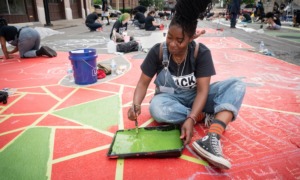
SmileStudio/shutterstock
.
A good friend of mine, a middle school teacher before going on to earn his Ph.D. in education leadership, once told me: “The problem with poor schools is that they are filled with poor kids.” That problem is twofold: young people who arrive on their first day of school significantly behind their peers, and schools that do not have enough time or resources to catch them up and keep them on course.

T.J. Delahanty
Many gaps in our communities contribute to disproportionate school success rates for different demographic groups. School systems generally do a solid job of hitting the mark for student success with students who come from well-resourced families. Where they struggle is with students who do not come from these well-resourced situations. This we know, we have known and have shown little sustained progress in addressing.
The opportunity gap between children who come from well-resourced families and those who are not contributes greatly to the differences in school readiness in that it is fundamentally a gap in the development of skill sets children need for school success: skills like communication, critical thinking and perseverance. Children whose families have the ability to support them with opportunities to develop those skills tend to thrive in the school space. Those supports and opportunities are likely to stay with them throughout their young lives, as school systems and life tend to reward the star pupils with more supports and opportunities.
Children whose families do not have the wherewithal to support this skill development start behind their peers, and take more time and more teacher attention to get caught up. Over the summer, these same young people fall behind again due to not having access to enrichment or development opportunities.
Neighborhood Programs Need Help
Out-of-school time programs have emerged as a significant player in supporting schools to address these gaps. School systems push providers to extend the school day, and parents focus on the safe space until they arrive home. In this context, many communities are realizing that the OST space is an opportunity to focus on giving the children on the wrong side of the opportunity gap a safe place to learn and practice the skills that contribute to success in school and life: those “soft” skills that other children get through family resources, supports and opportunities.
The nonprofits that occupy the OST world are diverse: from the nationally affiliated organizations with name brand recognition to local community centers and church-affiliated nonprofits and social entrepreneurs. The focus of OST program activities is as diverse as they are: sports, arts, music, literature, writing, STEM, recreation, homework help, tutoring, life skills and philanthropy; the list goes on and on. For many young people in our communities, these organizations provide opportunities and supports that they may not get otherwise.
The OST arena is a natural opportunity to address equity; not just equity in opportunities for children and youth, but also for the adults who work in this space. We can decrease the opportunity gap by supporting access to quality OST services for children from families who face difficulties.
This means more support for neighborhood-based programs. Support for programs needs to be not only funding, but also supports for organizations to provide quality youth development experiences that promote learning, as well as supports to collect data that speaks to success. Promoting access also means making it easier for families to know about programs available to them, and finding solutions to the transportation barrier that prevents many children from getting to and from these programs.
In short, we can support equity by helping all youth development organizations create spaces that provide supports and opportunities for young people to learn and practice the skills they need.
Sustainability for nonprofits a right
Supporting diversity of the nonprofits that provide out-of-school time services is another way to address the opportunity gap. The out-of-school time space is filled with volunteers and entrepreneurs inspired by their faith and/or own experiences, and who desire to give back to their communities by supporting kids who look like they did growing up. They want to use the skills they have gained while navigating a system skewed against them, to support young people just like them. These homegrown social entrepreneurs are often found operating outside the confines of well-known national organizations and are striving to make a living while helping families and youth succeed within systems that judge, categorize and stifle.
Sustainability for nonprofits that serve youth is a right. Understanding that supports equity. The funding system for nonprofit organizations is as inefficient as it is inequitable; those with connections “get” while those without connections struggle. Most funding sources require applications, relationships, reports, outcomes data and evaluation. Organizations that possess the capacity to spend the most time on these inputs are the ones most often awarded funding.
Most funders want to fund program activities and happy kids, not the capacity needed to support the programs, much less the capacity to develop sustainability and conduct data collection. Even nonprofits with development staff and personnel to support outcomes measurement struggle to sustain their programs. If OST programs that target young people who struggle to succeed are important to us, we need to ensure that those same organizations provide quality services, and that they are funded at levels that also allow them to succeed.
My community’s efforts are focused on supporting out-of-school time providers to focus on more than homework help and tutoring, by increasing staff and volunteer knowledge and capacity to incorporate data-driven youth development practices into their programming. Along the way, we have recognized that we can do this by intentionally considering equity in the organizations we support, and increasing access to quality OST programming for young people who most need these services, opportunities and supports.
T.J. Delahanty is a senior manager for youth success at Metro United Way in Louisville, Ky. He has a master’s in public policy from Rutgers University and has worked in the youth development field for 25 years internationally, at the state level and his hometown of Louisville.































